Lukashenka regime undermines Belarusian opposition prior to referendum
Government critics lack a unified strategy as constitutional referendum gets underway.
Lukashenka regime undermines Belarusian opposition prior to referendum
Share this story
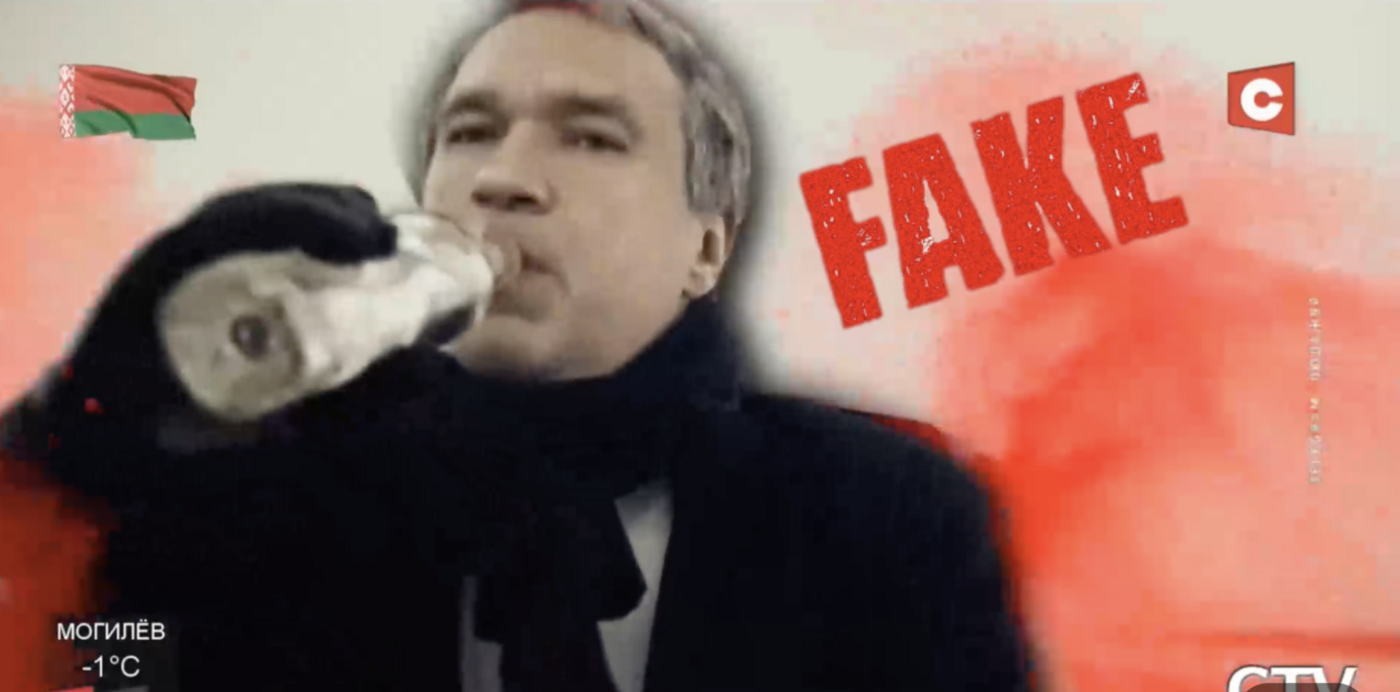
BANNER: A crude deepfake depicts opposition activist Pavel Latushka as a drunk individual climbing in and out of a car trunk, before calling on citizens to make a “sober decision” to support Lukashenka’s referendum. “FAKE” stamp added by the DFRLab. (Source: Telegram/archive)
Ahead of a February 27 constitutional referendum in Belarus, President Alyaksandr Lukashenka’s opponents are not united in their approach to protesting constitutional changes that would preserve Lukashenka’s power. The vote will take place amid Russia’s invasion of Ukraine, for which Belarus has been used as a staging ground by the Russian military and in which Belarusian forces have also reportedly participated.
The democratic opposition, led by Sviatlana Tsikhanouskaya, is promoting a strategy of intentionally spoiled ballots as a form of protest, encouraging residents to mark both options on the referendum ballot. Narodnaya Gramada, an unregistered social-democratic political party, put out a call, albeit less coordinated, to boycott the referendum. As for popular social media-based news services, some are amplifying the Tsikhanouskaya team’s campaign, while others like NEXTA and Chay z Malinovim Vorenyem are not.
Telegram was the main social media platform that members of the opposition used to share information and coordinate protests after Belarus’s rigged presidential election in August 2020. NEXTA in particular played a highly important role in building anti-Lukashenka sentiment and supporting the pro-democracy movement in Belarus.
In response to current opposition strategies, the Lukashenka regime is blocking access to web pages that discuss vote monitoring and the ballot-spoiling campaign, prosecuting people who share leaflets about ballot spoiling, releasing inflammatory content about Tsikhanouskaya’s allies, and accusing the opposition of making threats against members of polling station commissions.
The Kremlin has been pressuring Lukashenka to hold a constitutional referendum since the August 2020 disputed election that set off a political crisis in Belarus. The democratic opposition as well as other critics of Lukashenka’s regime believe that the referendum will further entrench Lukashenka’s power. For example, some of the proposed constitutional changes would protect him from prosecution and allow him to run for elections two more times.
Boycott the referendum or spoil the ballots?
To protest the referendum, Lukashenka’s critics have promoted two strategies: boycotting the referendum or intentionally spoiling ballots.
A video released by Tsikhanouskaya and her partners stated, “Lukashenka needs minimum voter turnout at the referendum. He will be happy if only voters loyal to him or voters forced by the regime participate.” There is no total number of votes necessary for the referendum to be considered valid, so the quote suggests that any number of loyal voters will help Lukashenka achieve his goal.
In November 2021, a number of organizations released a joint call to push citizens to invalidate their referendum ballots intentionally. The effort was led by Zubr, a political watchdog group; Chestnye Lydi, a citizen activism organization; and Platfoma Golos, a voting accountability organization. Allied organizations included Sviatlana Tsikhanouskaya’s office, People’s Anti-Crisis Management (headed by Pavel Latushka, the former director of a national theatre in Belarus who fled the country after expressing support for the anti-Lukashenka movement), and the coordination council of the Belarusian opposition.
Telegram posts from these groups advocating for ballot spoiling — all featuring similar, and sometimes identical, language — garnered a combined 212,400 views and 582 comments between November 20, 2021 and February 11, 2022. The number of views relative to the total number of subscribers in each channel was over 50 percent, which suggests the campaign has a respectable reach beyond the Telegram groups’ subscribers. For three of the six Telegram channels that posted the announcement — Platforma Golos, Zubr, and Sviatlana Tsikhanouskaya — the view count as of February 11 on the posts exceeded the total number of total subscribers.
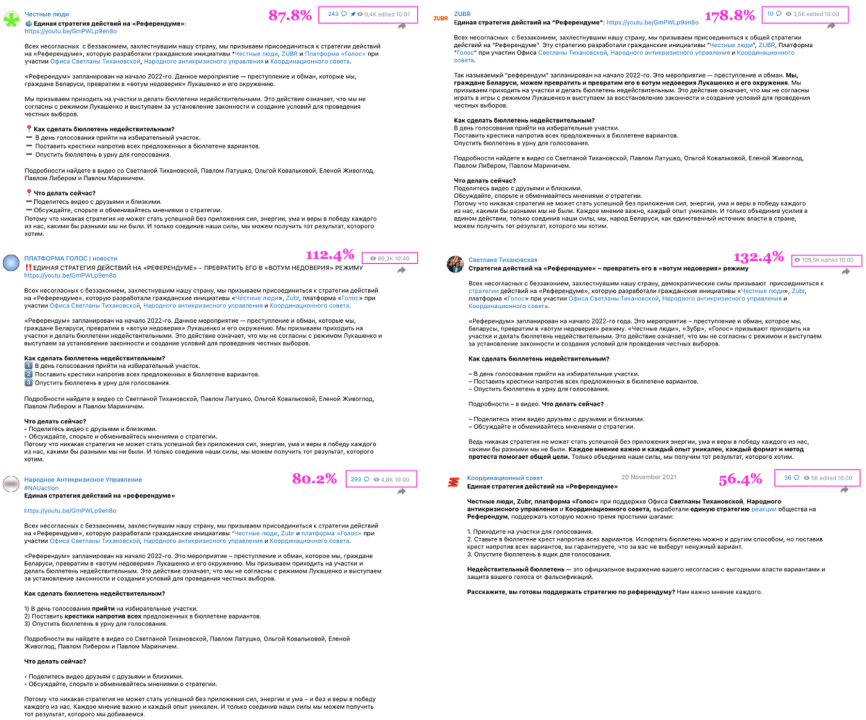
Meanwhile, the unregistered political party Narodnaya Gramada called for boycotting or ignoring the referendum by staying home. The party’s leader, Mikola Statkevich, is a political prisoner who has opposed Lukashenka’s rule since he came to power. Statkevich had once been referred to as the leader of the Belarusian opposition; during the 2020 presidential election, he supported Sergey Tsikhanousky, Sviatlana Tsikhanouskaya’s husband who was imprisoned well ahead of the 2020 presidential election. In issuing its call, the party stated on Telegram, “The ruling power needs high voter turnout, not less than half of the total voters. Therefore, any calls to ballot boxes only benefits Lukashenka. ‘Voting is not important — the counting is.’” The post garnered 517 views against 1,081 channel subscribers, amounting to 47.8 percent of potential views from subscribers alone, let alone views beyond the subscriber number.
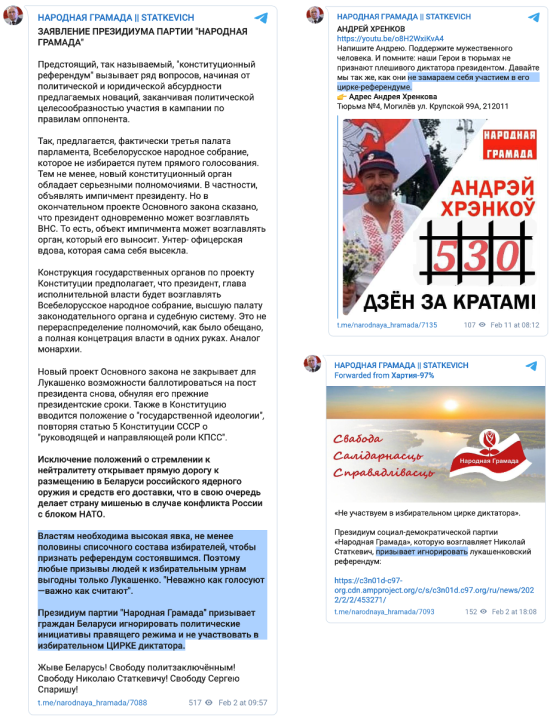
Exemplifying the discrepancies among the opposition, Leonid Kudinov, an independent Russian journalist in Belarus, released two videos on YouTube criticizing Tsikhanouskaya and her partners for promoting a “pointless” strategy. “Only provocateurs and traitors can call for such action,” he said. At the time of writing, Kudinov’s videos had garnered less than 400 views each. He also added a link to a Telegram group called “Boycott Lukavogo Referenduma” in the description of the videos. On January 26, the Minsk regional court — which is under the control of the Lukashenka regime — labeled the Telegram group as being “extremist.” The group had only 18 members when the DFRLab viewed it on February 11.
How popular Telegram channels responded to opposition campaigns
NEXTA and its associated Telegram channels — NEXTA, LUXTA, and NEXTA Live — have historically been among of the key sources of information for those opposing the Lukashenka regime. Stepan Putilo, a long-time regime critic who now resides in Poland, oversees the entire NEXTA portfolio.
All three of NEXTA’s Telegram channels place in the top ten most popular Telegram channels in Belarus. At the peak of its popularity, NEXTA’s eponymous Telegram channel had over 2 million subscribers and was considered the largest channel in the Russian language. The channels NEXTA and LUXTA are both categorized under the “politics” tag, while NEXTA Live is self-categorized as “news & mass media” and is currently the most popular Telegram channel in Belarus, having played a crucial role in coordinating protests during the 2020 elections.
The Lukashenka regime considers NEXTA to be an “extremist” outlet. In 2021, the regime forced a commercial flight to land in Minsk as a means of arresting NEXTA’s former editor-in-chief, Roman Protasevich.
In terms of the upcoming referendum, NEXTA Live and LUXTA have not promoted Tsikhanouskaya’s ballot-spoiling call, while NEXTA published a single post calling for Belarusian voters to mark both options on the ballot. The main NEXTA channel has also shared posts about the referendum protest activities of Golos, Pavel Latushka, and Tsikhanouskaya.
Chay z Malinovim Voreniem, one of the most popular Telegram channels in Belarus according to Telegram analysis tool Tgstat, had also not promoted the ballot-spoiling campaign as of February 11, while four of the other top ten had.
In comparing at the number of subscribers to these top ten Telegram channels, those that have not promoted the campaign reach an audience more than twice as large as those that have done so. On the other hand, if the same analysis is performed among the top ten channels in just the “politics” category, then the same calculation favors the channels that promote the ballot-spoiling strategy.
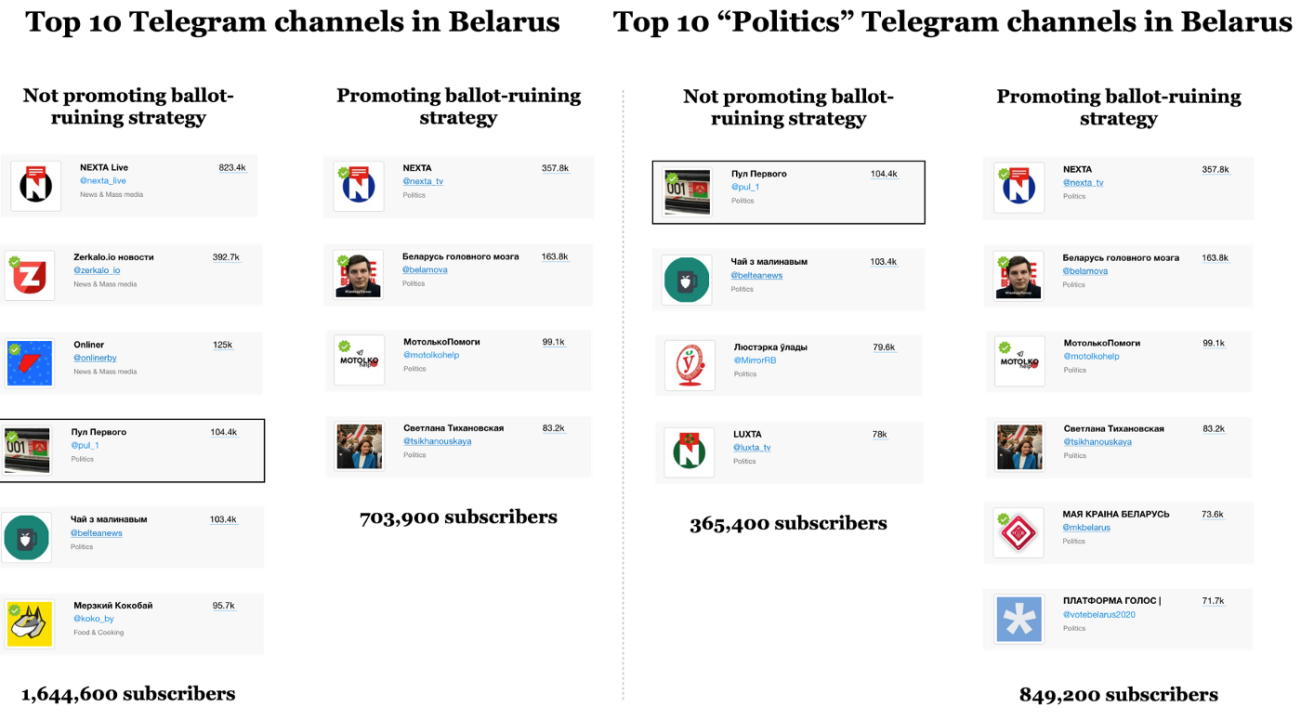
Lukashenka regime takes preventive measures
Lukashenka’s regime is aware of the two opposing strategies from his opponents and has taken action to prevent critics from disrupting the referendum.
The punishment in Belarus for actions that “create obstacles” for voters is five years in prison, regime-controlled outlet Belta.by reported, citing a representative from the Belarus Investigative Committee. The article, published on February 11, said the committee is investigating five such cases.
Pro-Lukashenka Telegram channels were eager to amplify a story about a woman who was detained for spreading leaflets advocating for a failed referendum. To date, none of the details around the story have been independently confirmed. Nevertheless, a regime-controlled television channel broadcast a story about the woman, saying she subscribed to many “extremist Telegram channels.” A video frame from the broadcast shows an image of her supposed leaflet, the design of which matched leaflets that Chesnye Lydi — one of the organizations mentioned above that issued the call to spoil ballots — encouraged its subscribers to print and spread.
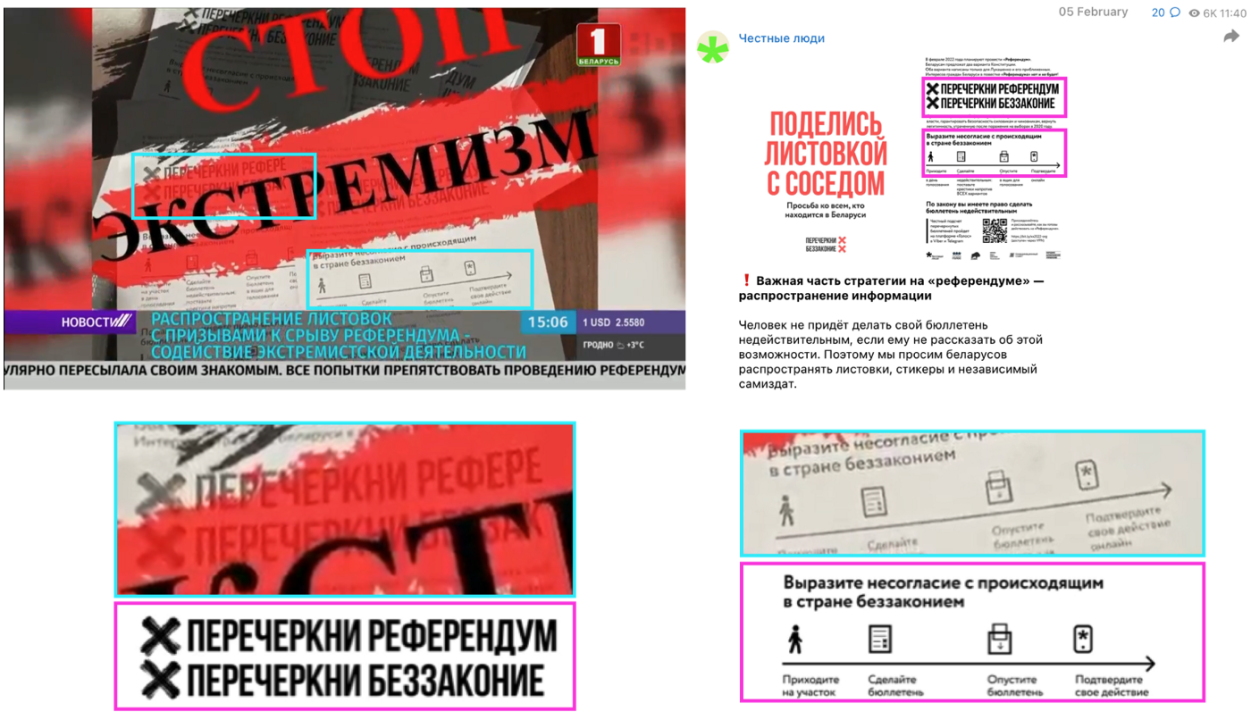
Without independent corroboration, however, it is impossible to know whether the details in the broadcast — including the image supposedly from the woman’s leaflet — were factual or fabricated.
To minimize the reach of the ballot-spoiling campaign, the regime blocked domestic access to two webpages, zubr.media and xx2022.org. Both remain accessible from abroad and through alternative domains in Belarus.
Separately, pro-regime Telegram channels spread content mocking Pavel Latushka and smearing the Chesnye Lydi organization, both of which have partnered with Tsikhanouskaya in the ballot-spoiling campaign. One video used unsophisticated deep-fake technology to depict Latushka coming out of a car trunk, drinking vodka, eating a pickle, and climbing back into the trunk. The video calls on citizens to make a “sober decision” at the referendum. Another video focusing on Chesnye Lydi used fragments from various public interviews with Elena Zhivoglod, the head of the organization. The narrator of the video used these fragments to suggest that the main goal of the organization was raising money that “will go into the pockets” of the organization’s members.
Pro–regime Telegram channels also started a social media flash mob using the hashtag #мынебоимся (#wearenotafraid). Regime supporters, all claiming to have received threats from regime opponents, posted videos saying that they are not afraid alongside the hashtag. If the claims of threats are accurate — none has yet been verified — one potential source may have come from Chesnye Lydi sharing a list of all polling station commission members and their photos during the 2020 presidential election, 80 percent of whom the organization estimated would be involved in the referendum. The Central Election Commission (CEC) said it will not release the new list of commission members, stating that it feared those involved in ballot counting would be targeted. The existing list could have triggered some supporters of the opposition to put psychological pressure on the people who will count votes at the referendum. Chesnye Lyudi counted eight videos as a part of the #мынебоимся campaign as of February 15, seven of which were uploaded to fringe Telegram channel Bez B Belarus.
Changing voting procedures
The most active contingent of Lukashenka critics currently resides abroad. On February 2, the CEC announced that it would not permit overseas voting, citing the pandemic, the small Belarusian diaspora, and a lack of embassy staff abroad. Similarly, the CEC decided not to use curtains to make voting cabins private, attributing it to COVID-related precautions. The lack of privacy within the voting cabins will make it easier for law enforcement to prevent the ballot-spoiling strategy at the polling stations.
Additionally, the only foreign observers invited to monitor the elections are from the Commonwealth of Independent States, a group of Russia-aligned countries that, among other things, supports Lukashenka’s rule.
The combined actions taken by the regime, its loyal TV channels, and Telegram accounts make it likely that the results of the referendum will favor Lukashenka. Both the regime and Tsikhanouskaya are calling for participation in the referendum to ensure a satisfactory voter turnout, though for different ends. Lukashenka’s regime has demonstrated that it is prepared for any civil unrest and noted that the efforts of the Belarusian opposition in exile might be insufficient. What remains unknown is whether Russia’s invasion of Ukraine — including using Belarus as a staging ground — might affect the outcome, if at all.
Cite this case study:
Nika Aleksejeva, “Lukashenka regime undermines Belarusian opposition prior to referendum,” Digital Forensic Research Lab (DFRLab), February 24, 2022, https://medium.com/dfrlab/lukashenka-regime-undermines-belarusian-opposition-prior-to-referendum-9417205924a2.

